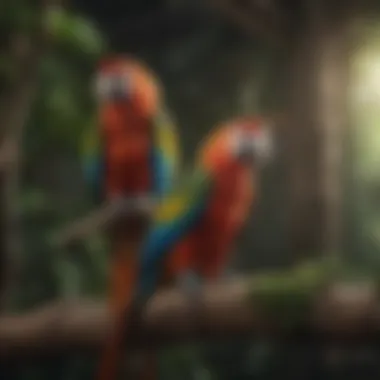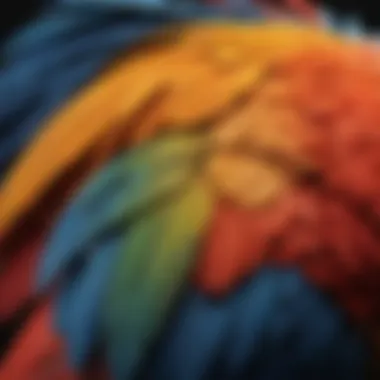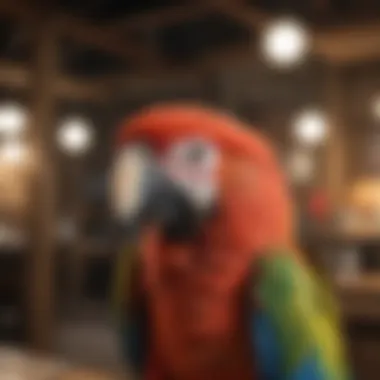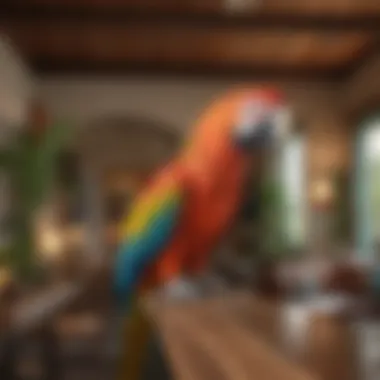Understanding the Financial Commitment of Macaw Ownership


Intro
Owning a macaw parrot is not just about having a pet; it involves significant financial and emotional commitments. Many people are drawn to these birds for their vibrant colors and captivating personalities. However, potential owners often underestimate the true costs associated with macaw ownership. This article explores the financial aspects of caring for these striking creatures.
By delving into initial purchase prices, ongoing maintenance costs, and market dynamics, we aim to provide thorough insights for both current and prospective macaw owners. Understanding these financial factors is crucial for ensuring that you can meet the needs of your future feathered friend.
Understanding Your Pet
Pet Behavior Basics
Macaws are intelligent, social animals that require substantial interaction. They often engage in playful antics, showing unique personality traits. Understanding their behavior patterns will help you accommodate their needs appropriately.
Common Breed Characteristics
Macaws come in various breeds, including the Blue-and-yellow Macaw, Scarlet Macaw, and Green-winged Macaw. Each has distinctive traits and requirements, influencing not just their purchase price but also ongoing care needs, which ultimately affect overall costs.
Species-Specific Needs
Each macaw species has special needs that relate to their diet, habitat, and socialization. Nutritional guidelines are particularly important, as the right diet directly impacts their health and longevity.
Pet Care and Maintenance
Feeding Guidelines
Feeding a macaw involves a mix of seeds, nuts, fruits, and specially formulated pellets. The average monthly expense for a balanced diet can range from $50 to $100, depending on the type of food you choose.
Grooming Essentials
Regular grooming helps maintain your macaw's health and well-being. This includes nail trimming and beak care, which may require professional assistance. Annual grooming expenses can amount to around $200.
Hygiene Practices
Maintaining a clean living environment is critical. Use safe cleaning agents and provide adequate space for exercising. A well-maintained cage contributes to your bird’s overall health and can prevent expensive veterinary bills down the line.
Training and Development
Basic Commands and Skills
Training your macaw is essential for fostering a strong bond. Teaching basic commands requires patience and consistency. Investing time in training can lead to long-term rewards, enhancing the quality of life for both you and your pet.
Behavioral Training Techniques
Using positive reinforcement techniques is recommended for macaws. These birds thrive on praise and reward, making the training process smoother and more effective.
Addressing Common Behavior Issues
Common issues include loud vocalizations and destructive behavior. Early intervention can help mitigate these problems and reduce potential damages in your home.
Health and Wellness
Routine Vet Check-ups
Regular veterinary check-ups are fundamental. Plan for annual visits which can cost between $100 to $300, including any preventive measures like blood tests or health screenings.
Vaccination Needs
Vaccinations may be necessary, depending on your location and specific risks. Discuss vaccination schedules with your vet to avoid any unexpected medical expenses.
Recognizing Signs of Illness
Being knowledgeable about common signs of illness ensures prompt medical attention. Early diagnosis can help avoid costly treatments and ensure a better quality of life for your macaw.


Enrichment and Activities
Indoor vs. Outdoor Activities
Macaws need both indoor and outdoor activities for their mental and physical stimulation. Rotating toys and creating safe outdoor spaces can promote well-being.
Interactive Toys and Games
Investing in a variety of toys will keep your macaw engaged. Budgeting around $20 to $50 each month for new toys can be worthwhile, as boredom can lead to behavior issues.
Socialization Opportunities
Macaws are social creatures. Engaging with them regularly is essential for their happiness. Consider participating in bird clubs or online communities on platforms like Reddit or Facebook to connect with other enthusiasts.
"Understanding the financial and time commitments of caring for a macaw is essential for any potential owner."
Understanding the Value of Macaw Parrots
Market Overview
The macaw market presents a dynamic landscape heavily influenced by various economic factors. Initially, the market is characterized by a mix of established breeders and independent sellers. Prices can range significantly, depending on the species, age, and more. For instance, species like the Scarlet Macaw or the Blue-and-yellow Macaw are typically at a higher price point due to their popularity and stunning appearance.
Current trends show an increasing interest in macaws, stemming from their intelligence and sociable nature. With the rise of social media showcasing these birds, more people are becoming interested in owning them. This growing interest can sometimes lead to inflated prices, particularly for specific rarer colors or well-bred individuals.
Comparison with Other Parrots
When comparing macaws to other parrots, such as African Grey or Cockatoos, several financial factors stand out. The cost of acquiring a macaw is generally higher than that of these other parrot species. Factors such as their size and care needs also lead to higher recurring expenses. While smaller parrots may have lower initial and maintenance costs, macaws offer an unparalleled presence and personality that many owners find worth the premium.
Additionally, the lifespan of macaws – which can exceed 50 years – necessitates a re-evaluation of ownership costs over time. Owners must also consider the higher dietary, housing, and veterinary expenses specific to macaws, effectively ensuring that they are ready for that long-term commitment.
Demand and Supply Factors
The interplay of demand and supply heavily influences macaw prices. Factors such as economic conditions, breeding cycles, and conservation efforts impact availability. A surge in demand can lead to increased prices, particularly for species that are seen as more exotic or that are currently in vogue among pet owners.
On the flip side, there are ethical considerations in supply that can also influence market trends. For example, conservation regulations may limit the capture or breeding of certain species, which in turn affects their market availability and pricing. Additionally, prospective buyers should be wary of buying from unethical sources, as these practices can undermine animal welfare and conservation efforts.
It is important for potential macaw owners to stay informed about market trends, as this awareness will guide their purchasing decisions wisely.
Initial Purchase Price of Macaws
Understanding the initial purchase price of macaws is vital for prospective owners. This price not only reflects the market value of these exotic birds but also serves as the foundation for their long-term financial commitment. The costs associated with acquiring a macaw vary significantly, influenced by various factors that potential owners need to consider. By grasping these initial expenses, buyers can better prepare themselves for the ongoing costs of ownership.
Factors Influencing Initial Costs
Many variables impact the initial purchase cost of a macaw, and understanding these can help potential buyers make informed decisions. Key factors include:
- Species Type: Different species of macaws have different price points. For example, a blue-and-yellow macaw generally costs less than a scarlet macaw.
- Age: Younger macaws tend to be more expensive due to their potential for a longer lifespan and the investment in training.
- Health Status: Birds with known health issues may be available for lower prices, but this could lead to higher veterinary bills later.
- Location: Prices may vary by geographical location, depending on the local market demand and availability.
Each of these factors plays a crucial role in determining how much the owner must invest at the outset.
Cost Variations by Species
When examining the price of macaws, species variation is significant. Different species have unique characteristics and popularity, affecting their prices:
- Blue-and-Yellow Macaw: Generally starts around $1,000 to $2,500.
- Scarlet Macaw: Typically ranges from $1,500 to $3,000.
- Green-Winged Macaw: Prices usually fall between $1,500 and $3,500.
- Hyacinth Macaw: Considered the most expensive, often costing between $6,000 to $12,000.
These costs reflect not only the market demand but also the care requirements and the general disposition of the species.
Breeders vs. Rescues
Deciding between purchasing from breeders or adopting from rescues can significantly influence initial costs.


- Breeders: Buying from a reputable breeder often guarantees a bird's health and lineage. However, this route tends to be more expensive, sometimes reflecting the costs of breeding practices and the quality of care provided.
- Rescues: Adopting from rescue organizations is often more affordable. Fees can range from a nominal donation to a few hundred dollars, covering initial veterinary care and sometimes including basic supplies.
While rescues might be a cost-effective option, potential owners should consider the bird's history and potential rehabilitation needs. Each route brings its benefits and responsibilities, ultimately shaping the overall financial landscape of macaw ownership.
Recurring Expenses of Macaw Ownership
Owning a macaw parrot goes beyond the initial purchase price. Potential owners must consider the recurring expenses that will be part of their monthly and annual budgets. These costs can add up significantly over time, impacting one’s financial planning and ability to provide proper care. Understanding these recurring expenses is essential for anyone considering ownership. It ensures that they can meet their bird's needs adequately and can enjoy their companionship without financial strain.
Feeding Costs
Feeding a macaw is an ongoing responsibility that must be carefully budgeted. Macaws have specific dietary requirements that include a variety of fresh fruits, vegetables, nuts, and seeds. High-quality pellets designed for psittacines should also form a part of their diet.
- Monthly Budget: The feeding costs can vary but typically range from $30 to $60 each month, depending on the bird's size and dietary preferences.
- Quality Matters: Investing in high-quality ingredients is crucial for the bird's health in the long run. Poor nutrition can lead to health issues, resulting in higher vet bills later on.
In summary, keeping a close eye on feeding expenses is vital. Allocating a specific monthly budget will help in managing this cost effectively.
Healthcare and Vet Visits
Regular healthcare is key to a macaw's well-being. It is essential to have routine check-ups with an avian vet, ideally every six months, to monitor health and prevent potential issues.
- Vet Costs: Expect to pay $50 to $150 per visit. Emergency vet visits can be significantly more expensive.
- Vaccinations and Medications: Additional healthcare expenses often arise for vaccinations and any required medications. Keeping a separate fund for unexpected health issues can also be wise.
Healthcare is not simply a one-time expense. Consistent investment in a bird's health contributes not only to a longer lifespan but also to a happier pet.
Housing and Accessories
Macaws require a suitable environment conducive to their needs. The initial setup involves purchasing a spacious cage and providing toys and accessories for them to engage with.
- Cage Costs: A high-quality macaw cage can cost between $300 and $1,200. The size and sturdiness are important since macaws are strong birds.
- Accessories: Monthly, you might spend an additional $20 to $50 on new toys and perches to keep the macaw mentally stimulated. These expenses might increase as toys need the to be replaced regularly due to wear and tear.
Providing an appropriate living space is essential for the health and happiness of a macaw. Without it, behavioral issues could arise.
Insurance Considerations
Having insurance for your macaw is another financial aspect to consider. While it does not cover all expenses, it can minimize the financial burden of unexpected health issues.
- Insurance Options: Policies can range from $10 to $40 per month, contingent upon the coverage specifics.
- Importance of Coverage: Insurance can help offset costs related to surgeries or serious medical conditions, thus providing peace of mind for the owner.
Choosing to insure your macaw can be a prudent decision, especially considering their potential health risks. It is better to be proactive than reactive regarding unexpected costs.
Regularly monitoring these expenses will provide a clearer picture of the financial commitment involved in macaw ownership.
Additional Financial Considerations
Long-Term Financial Commitment
Owning a macaw is a long-term endeavor. Macaws are known for their lifespan, which can average between 30 to 50 years, and in some cases, even longer. This longevity underscores the importance of long-term financial commitment when considering macaw ownership.
Costs that may arise in the future include routine veterinary check-ups, dietary needs, and unexpected health issues. Regular vet visits ensure the bird remains healthy, requiring a budget of around $100 to $300 annually. Special dietary needs may increase this amount, particularly if your macaw requires fresh fruits, vegetables, and specialized pellets designed for larger parrots.
Additionally, it is essential to plan for potential emergencies. Medical expenses can escalate quickly, and setting aside a separate fund for unforeseen events is advisable. Some owners find it beneficial to create an emergency fund amounting to at least $1,000 to $2,000, which can help absorb unexpected costs. The steady financial commitment does not just cover medical expenses, it also supports habitat maintenance, supplies, and enrichment activities to keep the bird mentally stimulated.
Potential Resale Value
The discussion surrounding the financial aspects of macaw ownership should also include potential resale value. While many owners may never consider selling their macaw, it is a factor worth evaluating in terms of long-term financial planning. Not every macaw will hold the same market value, which can be influenced by several factors such as age, rarity, and health.
- Age: Younger macaws often attract buyers more than older ones. However, older macaws may come with established behaviors and training, appealing to specific buyers.
- Health Status: A healthy bird generally retains higher value. If a macaw has been regularly maintained and has no medical issues, it holds more worth in the resale market.
- Species and Color Morphs: Some species, such as the Blue-and-gold Macaw or Scarlet Macaw, tend to have a higher base resale value. Rare color variants can also increase a bird’s attractiveness to potential buyers.
"The financial implications of owning a macaw are extensive. Preparedness is key to ensuring a fulfilling ownership experience."
By being aware of these additional financial factors, prospective owners can make better decisions, securing their position and the well-being of their feathery companions.


In summary, the long-term financial commitment and potential resale value are not mere footnotes in the ownership discussion. They are integral to planning and benefiting from the joy of sharing life with a macaw.
Factors That Affect Macaw Prices
Understanding the factors that influence the pricing of macaw parrots is essential for prospective owners and current enthusiasts alike. Price variability is significant due to several considerations, from the bird's age to its color variations. Knowing these elements can help buyers make informed decisions and align their budget with realistic expectations regarding owning a macaw.
Age and Health
The age of a macaw plays a crucial role in determining its price. Younger macaws often cost more due to their long lifespan and potential for bonding with owners. On the other hand, older macaws might be priced lower, but they may come with health issues or behavioral challenges that could require intensive care. Investors often seek healthy birds, making health an equally decisive factor in pricing. Macaws with a clean bill of health and proper vet documentation can command higher prices.
Owning a younger macaw does not only mean a longer companionship but can also mean they are easier to train. Conversely, if a buyer opts for an older bird, they should anticipate possible veterinary expenses.
Rare Colors and Variants
Macaws come in a myriad of colors and variants, with certain hues being more desirable than others. Birds exhibiting rare color mutations, such as the blue-yellow macaw or the scarlet macaw with unique feather patterns, often fetch higher prices. Collectors and enthusiasts are drawn to these rare variants for their aesthetic qualities and perceived exclusivity.
Understanding the market can help buyers identify when a specific color variant is in demand. It may be worthwhile to research the pricing trends of these rare colors over time, as this can significantly impact both current buying prices and future resale values.
Proven Breeding History
A macaw’s breeding history can greatly affect its price. Birds from established and reputable breeders with a strong lineage often carry a higher price tag. Proven breeding lines suggest that the bird is more likely to exhibit desirable traits, such as sociability and health. Buyers looking to invest in a macaw should consider obtaining birds with known backgrounds and good breeding practices.
Also, birds that have previously successfully bred can be valued significantly higher. This is important for those looking at macaws not just as pets but for potential breeding. Proven breeding history provides assurance and can result in higher financial returns for those who are serious about breeding.
Overall, understanding these factors can lead to a more informed purchasing experience and successful macaw ownership.
In sum, various factors influence the price of macaws, from age and health to color rarity and breeding history. Recognizing these elements is essential for potential macaw owners to make educated choices in their investment.
Ethical Considerations in Pricing
The financial aspect of owning a macaw parrot involves more than just numbers. It is essential to consider the ethical implications behind the prices associated with these birds. Understanding these ethical concerns can influence not only monetary decisions but also contribute to responsible ownership and promoting best practices within the bird trade.
Impact of the Wild Capture Trade
The wild capture trade has a significant impact on the availability and pricing of macaw parrots. Many species of macaws, particularly the endangered ones, are captured in their natural habitat and sold at a high price. This practice disrupts ecosystems and threatens the survival of these beautiful creatures. Additionally, wild-caught macaws often face health issues due to the stress of capture and transport.
Prices of wild-caught macaws can seem attractive compared to those from breeders, but they come with hidden costs. These birds may require more medical care, leading to higher long-term expenses. Pet owners need to reflect on the origin of their macaw and how it affects their well-being.
"Choosing responsibly sourced macaws helps to protect their natural habitats and ensures better health for these birds."
Supporting Ethical Breeders
Supporting ethical breeders is crucial in the macaw ownership community. Ethical breeders prioritize the health and welfare of their birds. They follow responsible breeding practices, including minimizing inbreeding and ensuring socialization in young birds. The price of a macaw from an ethical breeder may be higher than that of one from the wild capture trade, but it reflects the breeder’s commitment to quality care.
Investing in macaws from ethical sources can also impact the larger market. When owners choose to buy from breeders who prioritize the health of macaws, it encourages better standards across the industry. Potential buyers should research breeders carefully, looking for accreditations and adherence to animal welfare standards. This means going beyond the price tag and understanding the underlying values behind the decisions made.
The End and Recommendations for Prospective Owners
In this article, we have explored the various financial dimensions involved in owning a macaw parrot. Understanding ownership costs is crucial not just for planning but also for ensuring the well-being of the bird. With their long lifespan and specialized needs, financial preparedness is essential.
Macaws can provide companionship and beauty, but potential owners must consider the substantial expenses. This includes not only the initial purchase but also recurring costs related to diet, healthcare, and habitat maintenance. A thorough understanding of these expenses can prevent surprises and ensure a sustainable ownership experience.
When deciding to bring a macaw into your life, reflect on your financial situation and prepare accordingly. Conclusively, inclusively consider your long-term financial commitment, as macaws can live easily over 50 years. Prepare for fluctuations in living costs, which can affect your budget. Furthermore, ethical considerations should also influence your choices, from where to buy your bird to how to care for it.
Final Thoughts on Ownership Costs
The financial aspects of macaw ownership extend beyond mere monetary values. Each potential owner must look at their lifestyle and how it aligns with the needs of these vibrant birds. Initial expenses, such as the price for the macaw itself, can soar based on species or rarity, while ongoing costs like specialized foods or regular vet visits can accumulate significantly.
Owners should also contemplate hidden costs that might arise, such as emergency veterinary visits or unexpected replacements of damaged items due to a macaw's notorious curiosity. Furthermore, those considering adopting a macaw must think about the opportunity cost of their time and resources, balancing personal and social commitments with the needs of their pet.
"Investing in a macaw is not only a financial commitment but an emotional and time-consuming one that requires serious contemplation."
Resources for Potential Buyers
For those interested in bringing a macaw into their lives, a variety of resources are available. Educating oneself is key to making informed decisions. Here are some recommended resources:
- Wikipedia: A detailed general overview of macaws can be found at en.wikipedia.org.
- Britannica: Offers an insightful discussion of macaw species and their characteristics at britannica.com.
- Reddit: Engaging with communities of macaw owners can provide real-world advice and sharing of experiences can be found on reddit.com.
- Facebook: Joining groups specifically for macaw owners is another way to gain knowledge. Many groups share valuable tips and resources on facebook.com.
By utilizing these resources, prospective owners can enhance their understanding of both the costs and the necessary care required, ultimately leading to a more successful and rewarding ownership experience.







